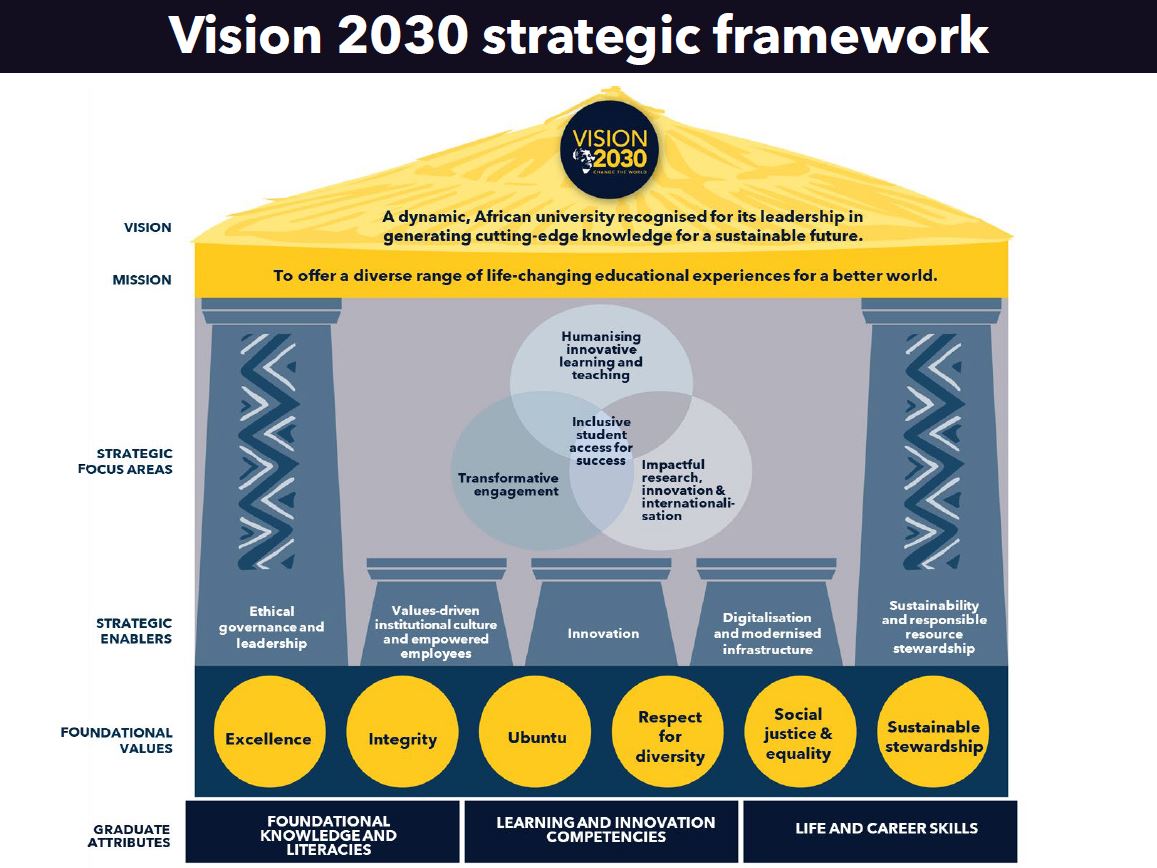
As the only university in the world to carry the name of Nelson Mandela, our institutional identity and core academic missions are underpinned by our namesake’s legacy, ethos and values. Against this background, it is of paramount importance that Nelson Mandela University positions itself strategically in the service of society, primarily through its core mandates of learning, teaching, research, innovation, internationalisation and engagement.
The University’s Vision 2030 strategy is an articulation of our strategic intentions and aspirations as we seek to embody the soul of Mandela through our core academic missions. In so doing, the University will strive to promote the public good through the expansion of human understanding, pushing forward the frontiers of knowledge, and cultivating socially conscious graduates who make a positive impact on society as responsible global citizens and leaders.
We invite all our stakeholders to journey with us as Nelson Mandela University sets out to be a dynamic, African university recognised for its leadership in generating cutting edge knowledge for a sustainable future.
Professor Sibongile Muthwa | Vice-Chancellor | Nelson Mandela University

Graduate Destinations Survey
TOWARDS 2030
Through Vision 2030, Mandela University reaffirms its commitment to change the world through life-changing, student-centric educational opportunities, innovative research, and transformative engagement that contribute to a better world. These core missions are supported and enabled through a values-driven, inclusive institutional culture that liberates the full potential of students, employees and communities as we seek to embody the legacy and ethos of our iconic namesake, Nelson Mandela.
READ MORE: Full V2030 Strategic Plan, the summarised Vision 2030 Alignment Presentation or the V2030 infographic pamphlet
LAYING THE FOUNDATION FOR VISION 2030
In laying the foundation for Vision 2030 and as part of a comprehensive stakeholder engagement strategy, the Vice-Chancellor, Professor Sibongile Muthwa, led an institution-wide listening campaign in 2018. The overarching objective of this campaign was to contribute, over time, to successfully addressing contextual issues facing the University, whilst enabling active stakeholder participation in shaping our institutional strategic aspirations beyond 2020.
The intention of the Listening Campaign was for senior leadership to listen to various publics to develop a comprehensive baseline on the state of the University to inform forward-looking strategy.
READ MORE: Vice-Chancellor's Listening Campaign Report
Given that fostering a values-driven, transformative institutional culture remains an important strategic priority for Mandela University, we have heeded the call for a Statement of Commitment to an Inclusive Institutional Culture to guide the conduct of all our stakeholders alongside our core values. Through the work of the Institutional Culture Working Group, this statement was embedded in the Vision 2030 Strategy and will inform targeted culture change interventions as an integral part of implementing institutional strategy within all faculties and support service divisions.
In 2021 the University embarked on a stakeholder mapping exercise to ensure that the crafting of the Vision 2030 institutional strategy was informed and shaped by the voices of students, employees, alumni and various other external stakeholders.
Internal and external stakeholders were engaged in Vision 2030 using a variety of methods, including administering an online survey and convening a series of focus group discussions with different permutations of students, employees, alumni and external stakeholders.
In crafting our Vision 2030 plan we carefully considered how we will ensure readiness for a volatile and uncertain future; how global mega-trends will impact our strategic positioning, priorities and futures thinking. Through this analysis and the inputs of our stakeholders, we assessed our strengths, weaknesses, opportunities and threats confronting higher education nationally and globally as we journey towards 2030 and beyond.
READ MORE: Envisioning pathways to Vision 2030: Global megatrends shaping the future of higher education
REVIEWING VISION 2020
After a decade of implementation, a wide-ranging review of Vision 2020 revealed distinctive intellectual niches and capabilities, as well as several areas for improvement, that need to be optimised and addressed by Mandela University as it seeks to chart its future strategic trajectories. Based on the outputs of these processes, senior management distilled core messages to underpin the formulation of the Vision 2030 institutional strategy.
READ MORE: V2020 Decadal Review in Infographics or the V2020 Decadal Review Narrative Report compiled in August 2020.
In her inaugural address of 2018, Vice-Chancellor, Prof Sibongile Muthwa quoted Maya Angelou's poem, On the Pulse of the Morning (1993) “History, despite its wrenching pain, cannot be unlived, but if faced with courage, need not be lived again.”
In her concluding remarks, she invited all stakeholders to join her in taking “…Nelson Mandela University boldly to the next level in the service of society.”
READ MORE: Vice-Chancellor’s Inaugural Address

READ MORE: Vision 2030 Five-Year Review Report